Is My Fish Fat Or Pregnant? You can not assume your fish is fat or pregnant by just looking at them. Most female fishes are naturally fatty; some look pregnant but are not. However, there are some signs you may look for to see if your fish is overweight or pregnant.
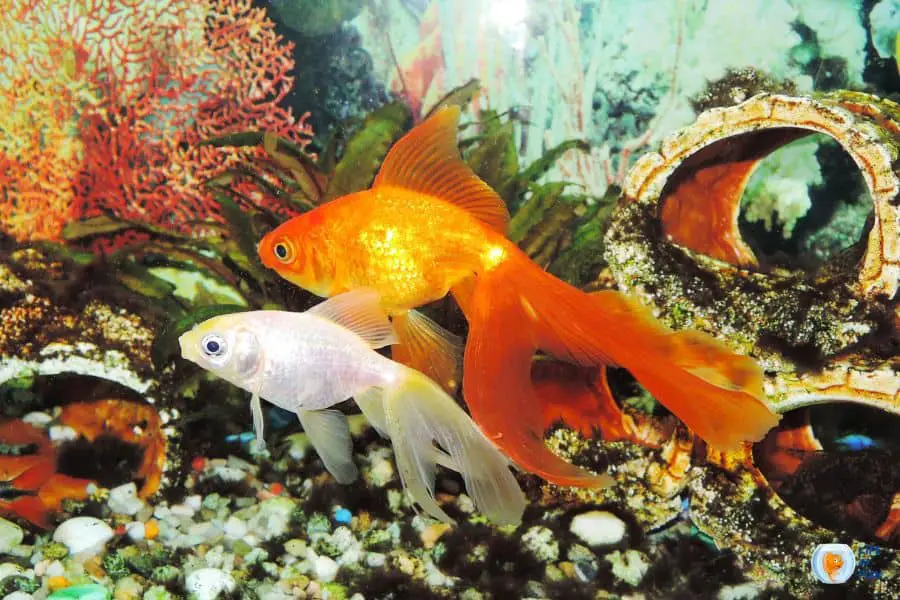
Owning a female fish is quite confusing sometimes because they become swollen for various reasons. It is essential to know if your fish is either fat or pregnant so that you can give her the proper care she needs. This article will help you understand whether your fish is pregnant or just fat.
The Difference Between A Fat Fish And A Pregnant Fish
Jump To
- 1 The Difference Between A Fat Fish And A Pregnant Fish
- 2 How Can You Tell If A Fish Is Pregnant?
- 3 Do Fish Get Fat When They’re Pregnant?
- 4 How Long Do Fish Stay Pregnant?
- 5 Signs Of A Fat Fish
- 6 What Causes A Fish To Become Fat?
- 7 How To Help A Fat Fish
- 8 Other Reasons For Swollen Fish
- 9 Dropsy
- 10 Possible Complications
- 11 Related questions
- 12 Is My Fish Fat Or Pregnant (Wrapping Up)
There will be no apparent change in appearance between a fat fish and a pregnant fish. It can be hard to tell them apart simply by looking at them. The main difference is the “pregnancy bulge,” a small bulge near the fish’s vent. This bulge is where the eggs are located in a pregnant fish. To help you determine if your fish is fat or pregnant, here are some things you can look for:
1. Look at the fish’s overall body shape. If the fish’s body is round and bloated, it is most likely fat. If the fish’s body is long and thin and the belly looks bloated, it is most likely pregnant. 2. Look for a small bulge near the vent of the fish. This bulge is usually an indication that the fish is pregnant. 3. Look at the fish’s behavior. If the fish swim around normally and eat well, it is most likely fat. If the fish is swimming lazily and not eating much, it is most likely pregnant.
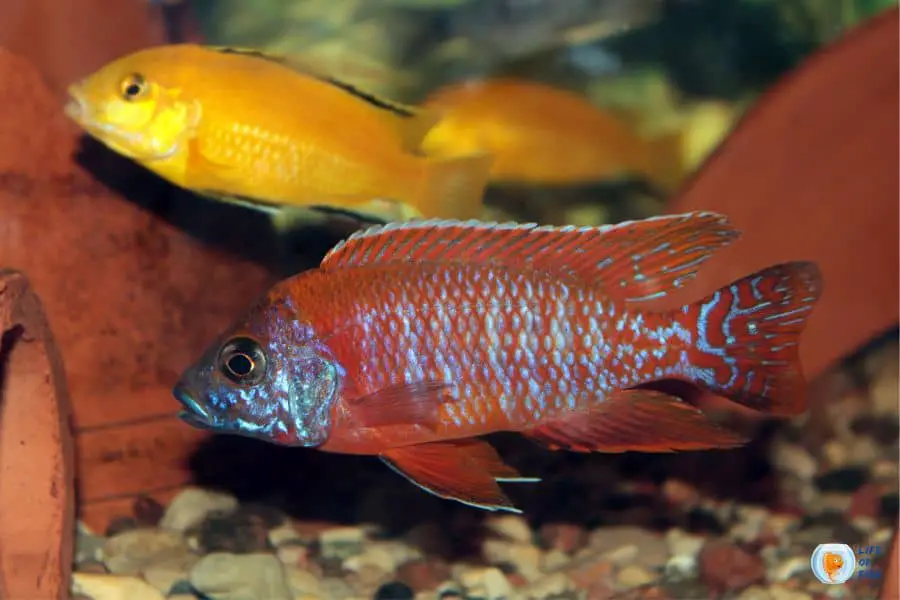
How Can You Tell If A Fish Is Pregnant?
If you think your fish might be pregnant, there are a few signs to look for.
Pregnancy Bulge in the Abdomen
One way to tell if your fish is pregnant is to check for a bulge in the abdomen. This bulge will typically be located at the back of the abdomen, and it should grow larger over the course of 20-40 days. When the fish is overweight but not pregnant, it may also have a bulge in the front chest area instead of the abdomen. If you’re not sure if your fish is pregnant, consider skipping one or two feedings. If the fish is truly pregnant, then the bulge should remain unchanged. However, if the bulge shrinks, then it was likely just fat storage.
Presence of “gravid spot.”
The abdomen of a pregnant fish will have a “gravid spot” near the rear vent. This black or brilliant crimson area expands throughout the pregnancy. Some fish have this brilliant spot by nature, but it gets darker as the female becomes gravid. As fry begins to develop inside, this brilliant spot on the fish’s belly will grow in size and darkness. If you cannot see the gravid spot, don’t worry. It is not always visible in every fish species.
Eggs in the Vent
As the female fish gets closer to giving birth, you may be able to see eggs in the vent. This clearly indicates that the fish is pregnant and ready to lay eggs.
Increased Appetite
A pregnant fish will have an increased appetite due to the extra energy needed to support the developing fry. If you notice your fish eating more than usual, it could be a sign that she is pregnant.
Decreased Activity Level
As the fry develops and grows inside the female fish, they will begin to take up more space. This can cause the fish to swim slower and be less active. If you notice your fish swimming lazily or “hanging out” at the bottom of the tank, she may be pregnant.
Nesting Behavior
Some fish species will build nests out of plants or algae when they are ready to lay eggs. If you notice your fish gathering materials and building a nest, it is a clear sign that she is pregnant.
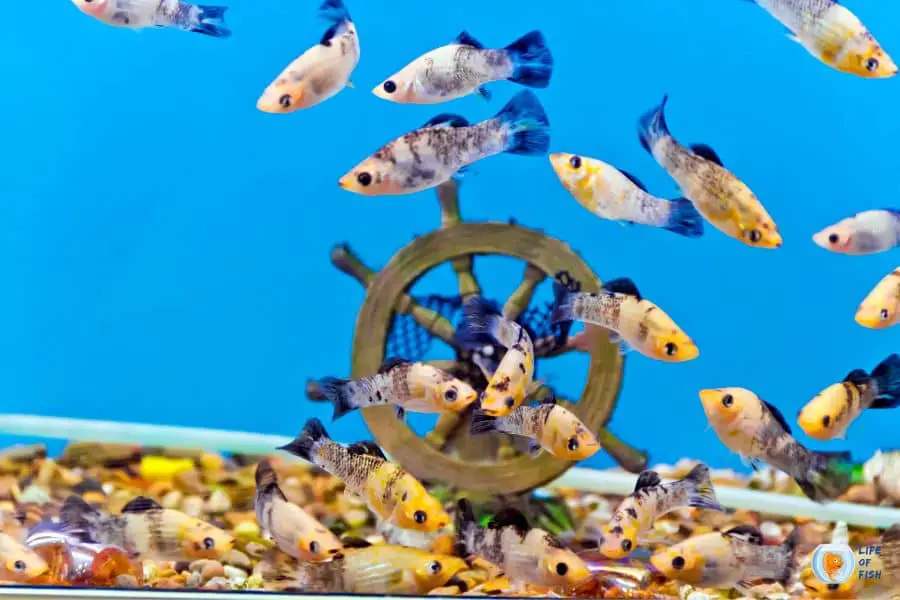
Do Fish Get Fat When They’re Pregnant?
No, fish do not get fat when they are pregnant. The extra weight that you may see is due to the developing fry inside the fish’s body. As the fry develops, the abdomen swells, and the fish appear to be “getting fat.” However, this is not actually fat – it is fry.
How Long Do Fish Stay Pregnant?
The length of pregnancy varies depending on the fish species. For example, guppies are typically pregnant for 4-8 weeks, while mollies can be pregnant for up to 10 weeks. In general, most fish species are pregnant for 6-8 weeks.
Signs Of A Fat Fish
Your fish may be fat if:
- Her abdomen is significantly larger than usual and extends beyond her pelvic fins
- Her body is shorter and thicker than usual
- She has a rounded shape
- Her scales appear to be “stuck together.”
- There are rolls of skin around her body
- Her fins are shorter than usual
What Causes A Fish To Become Fat?
A fish can become obese for a variety of causes.
Overfeeding
One of the most common reasons for obesity in fish is overfeeding. If your fish is eating more food than she needs, the excess calories will be stored as fat. It is important to feed your fish the appropriate amount of food based on her size and activity level.
Lack Of Exercise
Another common cause of obesity in fish is a lack of exercise. If your fish is not getting enough exercise, she will not burn off the excess calories from food and will instead store them as fat. In this case, you should provide your fish with plenty of space to swim and explore.
Inactive Fish
Some fish species are simply more prone to obesity than others. For example, goldfish are notoriously inactive and likely to become obese. If you have an inactive fish, it is important to be especially careful not to overfeed her.
How To Help A Fat Fish
If your fish is obese, you can do a few things to help her lose weight.
Reduce Food Intake
The first step is to reduce your fish’s food intake. You will need to cut back on the amount of food you are feeding her and/or switch to a lower-calorie food.
Increase Exercise
The next step is to increase your fish’s exercise. You can do this by giving her more space to swim and explore. You can also try adding a filter or aerator to the tank to increase the water movement and encourage your fish to swim more.
Monitor Weight
Finally, you will need to monitor your fish’s weight to ensure she is losing weight. You can do this by weighing her on a scale or by measuring her body size. If you notice your fish is gaining weight, you will need to increase her exercise and/or reduce her food intake. If you notice your fish is losing weight, you will need to increase her food intake.
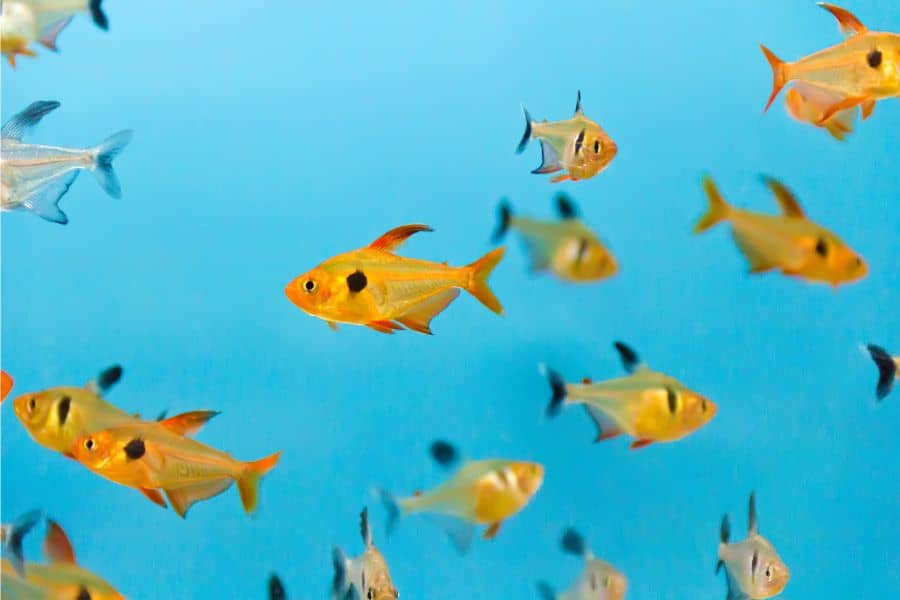
Other Reasons For Swollen Fish
Pregnancy and fat are not the only reasons why a fish may appear swollen. There are a few other potential causes, including:
Bloat
One potential cause of a swollen fish is bloat. Bloat is a condition where the fish’s stomach is filled with gas. This can cause the fish’s abdomen to swell and appear bloated.
Symptoms of Bloat
In addition to a swollen abdomen, fish with bloat may also display the following symptoms:
- A loss of appetite
- Lethargy
- Swimming awkwardly
- Floating upside down
- Gasping for air
If you see any of the above signs in your fish, take her to the veterinarian for treatment.
Kidney Disease
Kidney disease is another possible reason for bloated fish. It is a condition in which the kidneys are unable to efficiently filter toxins from the body. This can result in fluid accumulation in the body, resulting in a bloated fish.
Symptoms of Kidney Disease
In addition to a swollen abdomen, fish with kidney disease may also display the following symptoms:
- Lethargy
- A loss of appetite
- Weight loss
- Sluggishness
- Bulging of the eye (exophthalmos)
Kidney diseases in fish are usually not treatable, and the fish will die most of the time.
Cancer
Cancer is another potential cause of swollen fish. Cancerous tumors can grow anywhere in the body and may cause the fish to appear swollen.
Symptoms of Cancer
In addition to a swollen abdomen, fish with cancer may also display the following symptoms:
- Loss of appetite
- Protruding scales
- Weight loss
- Lethargy
Unfortunately, there is no cure for cancer and tumors in fish. The only way to stop their suffering is to euthanize them. However, you should be certain that your fish has cancer or tumor before taking any decision.
Dropsy
Dropsy is a condition that can cause the fish to appear swollen. It is caused by a bacteria infection and can be fatal if left untreated.
Symptoms of Dropsy
In addition to a swollen abdomen, fish with dropsy may also display the following symptoms:
- Scales with a pinecone-like appearance
- Loss of appetite
- Weight loss
- Bulging eyes
- Pale gills
- Lethargy
- Red and swollen anus
- Fins clamped together
- Redness of the fins or sin
- Pale and stringy feces
- Ulcers on the body
- Curved spine
- Refusal to eat
- Swimming near the surface
If you notice any of these symptoms in your fish, you should take her to the vet for treatment.
Treatment of Dropsy
If your fish has dropsy, she will need to be treated with antibiotics. The vet may also recommend that you increase the temperature of the water and add salt to the tank. You will need to continue treating your fish with antibiotics for at least two weeks after the symptoms have gone away.
Prevention of Dropsy
You can help prevent dropsy by cleaning your tank and using a good filter. You should also quarantine your new fish before adding them to your tank. Avoid overfeeding your fish and be sure to remove any uneaten food from the tank.
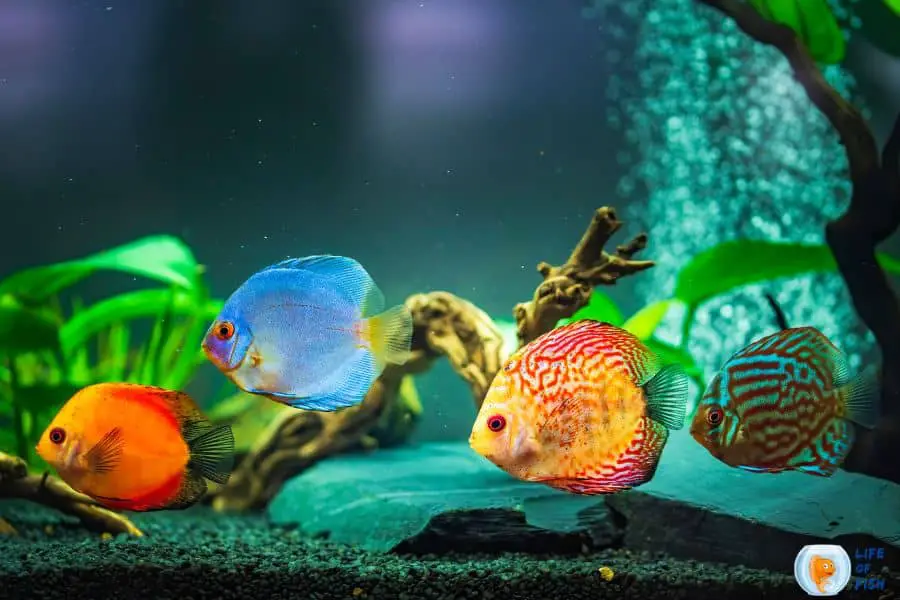
Possible Complications
If your fish is suffering from any of the conditions mentioned above, she may be at risk for complications. Some of the potential complications include:
- Fins rotting away
- Ulcers
- Infections
- Cataracts
- Kidney failure
- Death
If you observe the above symptoms above in your fish, take her to the vet right away.
Related questions
Is fish bloat contagious?
Fish bloat is not contagious, but dropsy can spread among fish in an aquarium if one of them becomes afflicted. If one fish in an aquarium gets dropsy, other fish of the same species may be at risk. The fish are affected one by one until no more of that species are left (or the underlying problem is resolved).
Do pregnant fish stay at the bottom of the tank?
Pregnant fish may stay at the bottom of the tank, but this is not always the case. Some pregnant fish swim near the surface, while others remain in the middle of the tank. If your pregnant fish remains at the bottom of the tank, it is possible that she is about to give birth and needs a safe spot to do so.
When should I worry about my fish being pregnant?
If your fish looks like she is ready to give birth but hasn’t done so after two days, you should take her to the vet. If your fish shows any other signs of illness, such as loss of appetite or lethargy, you should also take her to the vet.
Do fish eat their babies?
Yes, fish may eat their babies if they are not well-fed. However, this is not always the case. Some fish species like cichlids and gouramis are known to be good parents and will care for their young. If you think that your fish might eat her babies, you can try feeding her more often or giving her live food. You can also try adding plants to the tank, providing hiding places for the babies.
Is My Fish Fat Or Pregnant (Wrapping Up)
Determining the pregnancy or fatness of your fish can be a tricky task. If you’re not sure whether your fish is pregnant or just fat, it’s best to take her to the vet. The vet can determine if your fish is pregnant or just fat and can provide you with treatment options. If you think your fish is pregnant, you’ll need to take some extra steps to care for her. Pregnant fish need more food and a bigger tank. You’ll also need to be careful not to overfeed her, as this can lead to complications.
If you think your fish is just fat, you’ll need to change your diet and exercise regimen. Fat fish are more likely to suffer from health problems like heart disease and diabetes. So, it’s important to help them maintain a healthy weight. Caring for pregnant or fat fish can be challenging, but seeing your fish healthy and happy is worth it.
Read Next : Hairy Puffer Tank Setup | Everything In Nut-Shell |
